体育运动(Sports and Games)
四年级上册英语教案- Unit 1 Sports and Games Lesson 3 人教新起点
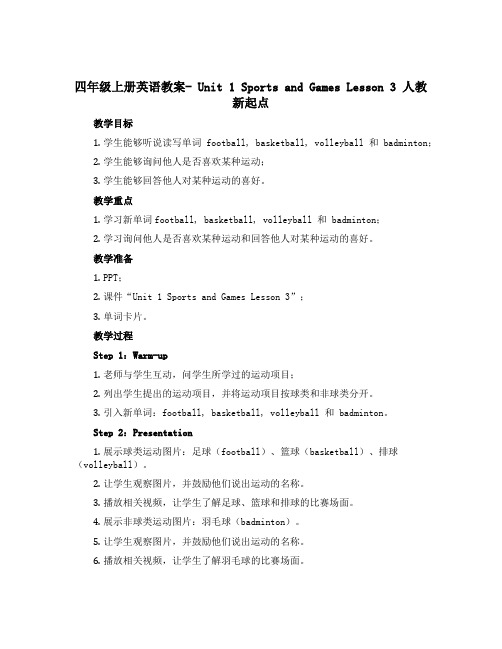
四年级上册英语教案- Unit 1 Sports and Games Lesson 3 人教新起点教学目标1.学生能够听说读写单词football, basketball, volleyball 和 badminton;2.学生能够询问他人是否喜欢某种运动;3.学生能够回答他人对某种运动的喜好。
教学重点1.学习新单词football, basketball, volleyball 和 badminton;2.学习询问他人是否喜欢某种运动和回答他人对某种运动的喜好。
教学准备1.PPT;2.课件“Unit 1 Sports and Games Lesson 3”;3.单词卡片。
教学过程Step 1:Warm-up1.老师与学生互动,问学生所学过的运动项目;2.列出学生提出的运动项目,并将运动项目按球类和非球类分开。
3.引入新单词:football, basketball, volleyball 和 badminton。
Step 2:Presentation1.展示球类运动图片:足球(football)、篮球(basketball)、排球(volleyball)。
2.让学生观察图片,并鼓励他们说出运动的名称。
3.播放相关视频,让学生了解足球、篮球和排球的比赛场面。
4.展示非球类运动图片:羽毛球(badminton)。
5.让学生观察图片,并鼓励他们说出运动的名称。
6.播放相关视频,让学生了解羽毛球的比赛场面。
Step 3:Practice1.让学生获得更多的练习:PPT上展示图片和儿歌《大家踢足球》。
2.让学生跟随PPT念读歌词,加深对于“football”的理解。
3.学生进行角色扮演,练习问答:“Do you like playingfootball/basketball/badminton/volleyball?”/“Yes, I do.”/“No, I don’t.”Step 4:Production1.让学生在课堂上进行比赛:以小组为单位,进行足球、篮球、排球或者羽毛球的比赛,选出胜者。
新人教版新起点英语小学四年级上册《Unit1 sports and games》优质课公开课教案 (3)
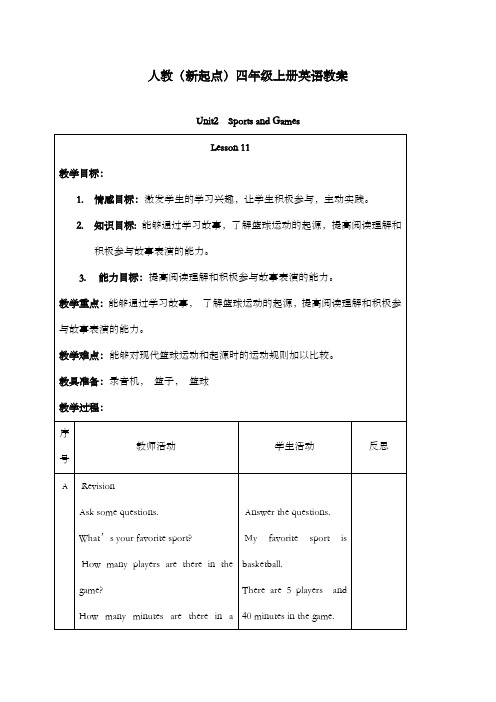
人教(新起点)四年级上册英语教案Unit2 Sports and GamesLesson 11教学目标:1.情感目标:激发学生的学习兴趣,让学生积极参与,主动实践。
2.知识目标:能够通过学习故事,了解篮球运动的起源,提高阅读理解和积极参与故事表演的能力。
3. 能力目标:提高阅读理解和积极参与故事表演的能力。
教学重点:能够通过学习故事,了解篮球运动的起源,提高阅读理解和积极参与故事表演的能力。
教学难点:能够对现代篮球运动和起源时的运动规则加以比较。
教具准备:录音机,篮子,篮球教学过程:序号教师活动学生活动反思 A RevisionAsk some questions.What’s your favorite sport?How many players are there in the game?How many minutes are there in a Answer the questions.My favorite sport is basketball.There are 5 players and 40 minutes in the game.B C D E game?How many scores?Yes, you are right.Do you know the origination ofbasketball?Let’ s tell you a interesting story.Open your books.Fill in the form.Ask some students to say about theiranswers.Listen to the tape and repeat sentenceby sentence. And then translate intoChinese.Look and listen to thestory.Open the books and writedown the answers in theform.S1: Basketball in 1891,there are 9 players, andcan’t run with the ball.S2: Basketball today, thereare 5 players, and can runwith the ball.Read one sentence by onesentence and translate intoChinese.F Act it out. Act it out.Lesson 12教学目标:1.情感目标:通过自评和互评,使学生树立自信心。
2022年人教版(新起点)英语四上Unit 1《Sports and Games》单元分析
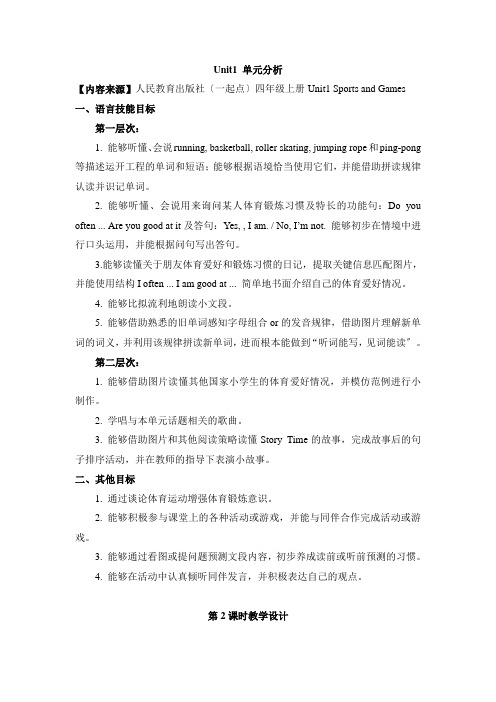
Unit1 单元分析【内容来源】人民教育出版社〔一起点〕四年级上册Unit1 Sports and Games 一、语言技能目标第一层次:1. 能够听懂、会说running, basketball, roller skating, jumping rope和ping-pong 等描述运开工程的单词和短语;能够根据语境恰当使用它们,并能借助拼读规律认读并识记单词。
2. 能够听懂、会说用来询问某人体育锻炼习惯及特长的功能句:Do you often ... Are you good at it及答句:Yes, , I am. / No, I’m not. 能够初步在情境中进行口头运用,并能根据问句写出答句。
3.能够读懂关于朋友体育爱好和锻炼习惯的日记,提取关键信息匹配图片,并能使用结构I often ... I am good at ... 简单地书面介绍自己的体育爱好情况。
4. 能够比拟流利地朗读小文段。
5. 能够借助熟悉的旧单词感知字母组合or的发音规律,借助图片理解新单词的词义,并利用该规律拼读新单词,进而根本能做到“听词能写,见词能读〞。
第二层次:1. 能够借助图片读懂其他国家小学生的体育爱好情况,并模仿范例进行小制作。
2. 学唱与本单元话题相关的歌曲。
3. 能够借助图片和其他阅读策略读懂Story Time的故事,完成故事后的句子排序活动,并在教师的指导下表演小故事。
二、其他目标1. 通过谈论体育运动增强体育锻炼意识。
2. 能够积极参与课堂上的各种活动或游戏,并能与同伴合作完成活动或游戏。
3. 能够通过看图或提问题预测文段内容,初步养成读前或听前预测的习惯。
4. 能够在活动中认真倾听同伴发言,并积极表达自己的观点。
第2课时教学设计【内容来源】人民教育出版社〔一起点〕四年级上册Unit1 Sports and Games 【课时】第1课时一、教学目标1. 能够听懂、会说running, basketball, roller skating, jumping rope和ping-pong 等描述运开工程的单词和短语;能够根据语境恰当使用它们,并能借助拼读规律认读和识记单词。
四年级秋季《英语》(人教版)Unit 1 Sports and Games (第一课时) - 任务单
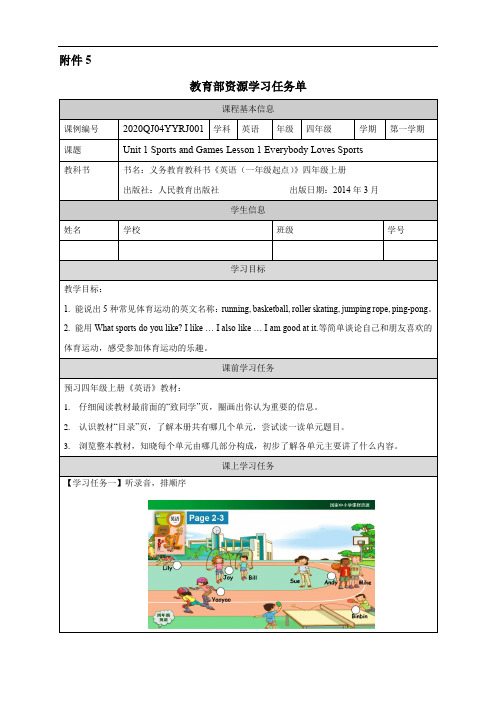
附件5教育部资源学习任务单【学习任务一】听录音,排顺序(录音材料:It’s 3:30. It’s our sports time. Look, the students are all on the playground. Binbin is playing ping-pong with his classmate. Wow, it’s an intense match. Andy is going to play basketball. He is the basketball star of our school. Joy is jumping rope with Bill. She can jump more than 300 times without stopping. Yaoyao is roller skating with her friend. It’s ver y cool and exciting. Where is Lily? Look, she is running over there. Oh, she can run very fast. Everybody loves sports in our school, because sports can keep us healthy and bring us a lot of fun. What sports do you like?)【学习任务二】听录音,读单词【学习任务三】听录音,读句子Binbin likes playing ping-pong. He is really good at it.Andy likes playing basketball. He is the basketball star of the school.Joy likes jumping rope. She can jump more than 300 times without stopping.Yaoyao likes roller skating. It’s cool and exciting.Lily likes running. She can run very fast.【学习任务四】欣赏歌谣,跟唱歌谣【学习任务五】欣赏歌曲,拓展词汇,谈论他人s 【学习任务六】运用词句,谈论自己视频:Learn Different Names of Sports for Kids (视频资源请见资料包)。
Unit1 Sports and Games终点单词句型
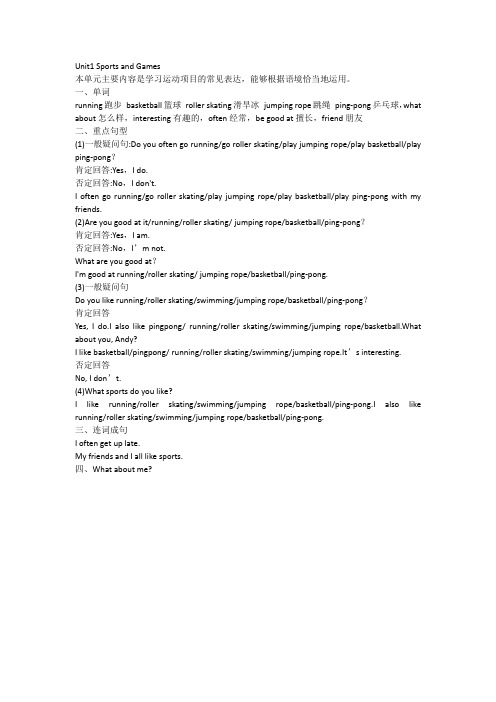
Unit1 Sports and Games本单元主要内容是学习运动项目的常见表达,能够根据语境恰当地运用。
一、单词running跑步basketball篮球roller skating滑旱冰jumping rope跳绳ping-pong乒乓球,what about怎么样,interesting有趣的,often经常,be good at擅长,friend朋友二、重点句型(1)一般疑问句:Do you often go running/go roller skating/play jumping rope/play basketball/play ping-pong?肯定回答:Yes,I do.否定回答:No,I don't.I often go running/go roller skating/play jumping rope/play basketball/play ping-pong with my friends.(2)Are you good at it/running/roller skating/ jumping rope/basketball/ping-pong?肯定回答:Yes,I am.否定回答:No,I’m not.What are you good at?I'm good at running/roller skating/ jumping rope/basketball/ping-pong.(3)一般疑问句Do you like running/roller skating/swimming/jumping rope/basketball/ping-pong?肯定回答Yes, I do.I also like pingpong/ running/roller skating/swimming/jumping rope/basketball.What about you, Andy?I like basketball/pingpong/ running/roller skating/swimming/jumping rope.It’s interesting.否定回答No, I don’t.(4)What sports do you like?I like running/roller skating/swimming/jumping rope/basketball/ping-pong.I also like running/roller skating/swimming/jumping rope/basketball/ping-pong.三、连词成句I often get up late.My friends and I all like sports.四、What about me?。
人教版一年级起点小学四年级英语上册教案Unit 1 Sports and Games Lesson 1
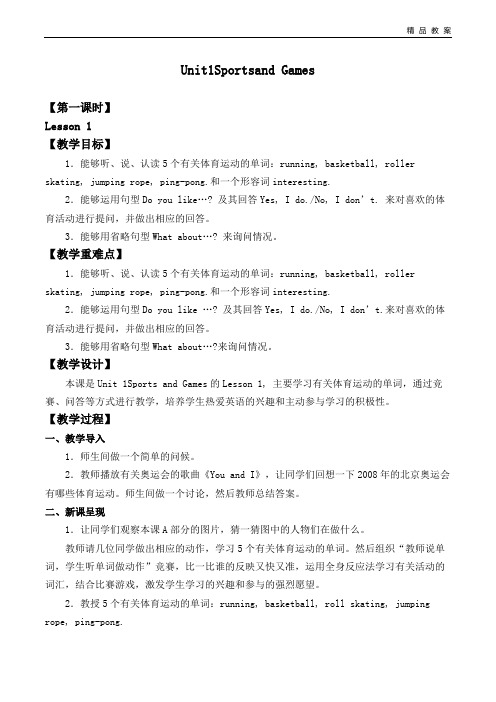
Unit1Sportsand Games【第一课时】Lesson 1【教学目标】1.能够听、说、认读5个有关体育运动的单词:running, basketball, roller skating, jumping rope, ping-pong.和一个形容词interesting.2.能够运用句型Do you like…? 及其回答Yes, I do./No, I don’t. 来对喜欢的体育活动进行提问,并做出相应的回答。
3.能够用省略句型What about…? 来询问情况。
【教学重难点】1.能够听、说、认读5个有关体育运动的单词:running, basketball, roller skating, jumping rope, ping-pong.和一个形容词interesting.2.能够运用句型Do you like …? 及其回答Yes, I do./No, I don’t.来对喜欢的体育活动进行提问,并做出相应的回答。
3.能够用省略句型What about…?来询问情况。
【教学设计】本课是Unit 1Sports and Games的Lesson 1, 主要学习有关体育运动的单词,通过竞赛、问答等方式进行教学,培养学生热爱英语的兴趣和主动参与学习的积极性。
【教学过程】一、教学导入1.师生间做一个简单的问候。
2.教师播放有关奥运会的歌曲《You and I》,让同学们回想一下2008年的北京奥运会有哪些体育运动。
师生间做一个讨论,然后教师总结答案。
二、新课呈现1.让同学们观察本课A部分的图片,猜一猜图中的人物们在做什么。
教师请几位同学做出相应的动作,学习5个有关体育运动的单词。
然后组织“教师说单词,学生听单词做动作”竞赛,比一比谁的反映又快又准,运用全身反应法学习有关活动的词汇,结合比赛游戏,激发学生学习的兴趣和参与的强烈愿望。
2.教授5个有关体育运动的单词:running, basketball, roll skating, jumping rope, ping-pong.(1)教师出示单词卡片,让学生看卡片跟着教师学习,并让学生根据图片说出这些单词的中文意思。
四年级英语上册Unit2sportsandgamesLesson78教案人教新起点
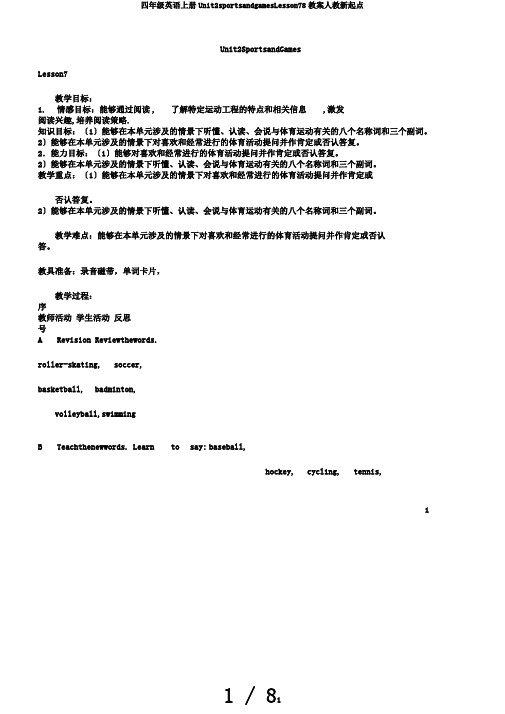
Unit2SportsandGamesLesson7教学目标:1. 情感目标:能够通过阅读, 了解特定运动工程的特点和相关信息,激发阅读兴趣,培养阅读策略.知识目标:〔1〕能够在本单元涉及的情景下听懂、认读、会说与体育运动有关的八个名称词和三个副词。
2〕能够在本单元涉及的情景下对喜欢和经常进行的体育活动提问并作肯定或否认答复。
2.能力目标:〔1〕能够对喜欢和经常进行的体育活动提问并作肯定或否认答复。
2〕能够在本单元涉及的情景下听懂、认读、会说与体育运动有关的八个名称词和三个副词。
教学重点:〔1〕能够在本单元涉及的情景下对喜欢和经常进行的体育活动提问并作肯定或否认答复。
2〕能够在本单元涉及的情景下听懂、认读、会说与体育运动有关的八个名称词和三个副词。
教学难点:能够在本单元涉及的情景下对喜欢和经常进行的体育活动提问并作肯定或否认答。
教具准备:录音磁带,单词卡片,教学过程:序教师活动学生活动反思号A Revision Reviewthewords.roller-skating, soccer,basketball, badminton,volleyball,swimmingB Teachthenewwords. Learn to say: baseball,hockey, cycling, tennis,1hiking,joggingC Listen tothetape.Answerthe Answerthequestion.question.Andylikeshockey.WhatdoesAndylike?Binbinlikes baseball andAndwhatdoesBinbinlike?roller-skating.Teachtosay.Learntosaythisdialogue.S1: Doyou like Hockey/D Playagame.baseball ?Askastudentcometothefront.AskS2:Yes,Ido./No,Idon’t.himorherthink, whichsports doesheorshelikebest?OthersGuess.Andasksb.guessDoyoulike ?S1: Doyou like Hockey/E Chaingame.baseball ?S2:Yes,Ido./No,Idon’t.Askandansweronebyone.Listentothetape.Thenteachthechant.Andaskthemtomakeanewone.Listenandlearntosay thischant.Make a new chant withpartners.Lesson8教学目标:1. 情感目标:教育学生热爱体育运动,积极参加体育锻炼。
四年级上册英语教案-Unit1《SportsandGames》第1课时|人教新起点
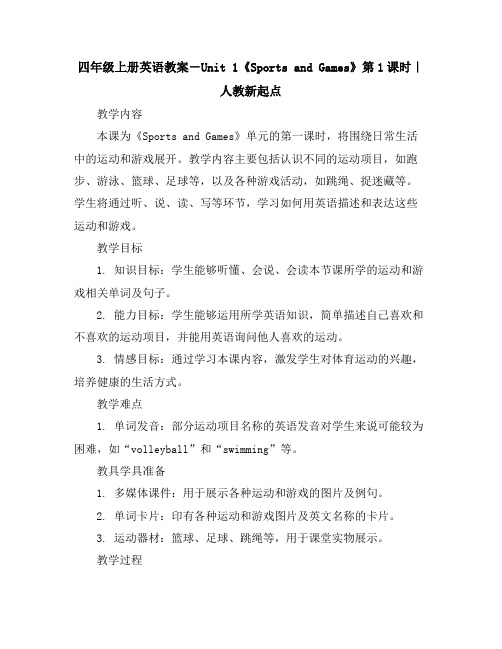
四年级上册英语教案-Unit 1《Sports and Games》第1课时|人教新起点教学内容本课为《Sports and Games》单元的第一课时,将围绕日常生活中的运动和游戏展开。
教学内容主要包括认识不同的运动项目,如跑步、游泳、篮球、足球等,以及各种游戏活动,如跳绳、捉迷藏等。
学生将通过听、说、读、写等环节,学习如何用英语描述和表达这些运动和游戏。
教学目标1. 知识目标:学生能够听懂、会说、会读本节课所学的运动和游戏相关单词及句子。
2. 能力目标:学生能够运用所学英语知识,简单描述自己喜欢和不喜欢的运动项目,并能用英语询问他人喜欢的运动。
3. 情感目标:通过学习本课内容,激发学生对体育运动的兴趣,培养健康的生活方式。
教学难点1. 单词发音:部分运动项目名称的英语发音对学生来说可能较为困难,如“volleyball”和“swimming”等。
教具学具准备1. 多媒体课件:用于展示各种运动和游戏的图片及例句。
2. 单词卡片:印有各种运动和游戏图片及英文名称的卡片。
3. 运动器材:篮球、足球、跳绳等,用于课堂实物展示。
教学过程1. 热身活动:通过播放英文儿歌,营造英语学习氛围,同时复习之前学过的简单运动相关词汇。
2. 新课导入:利用多媒体展示不同的运动和游戏图片,引导学生用英语进行描述。
3. 词汇教学:教师出示单词卡片,教授新运动和游戏词汇,并通过游戏方式加强记忆。
4. 句型练习:通过角色扮演,让学生练习如何用英语询问和表达对运动的喜好。
5. 小组活动:学生分组,用所学英语讨论各自喜欢的运动和游戏,并汇报讨论结果。
板书设计板书将简洁明了地展示本节课的重点单词和句型。
例如:Key Vocabulary:runswimbasketballfootballUseful Sentences:I like to play basketball.Do you like to swim?My favorite sport is football.作业设计1. 书面作业:完成课后练习册中与本课内容相关的练习题。
- 1、下载文档前请自行甄别文档内容的完整性,平台不提供额外的编辑、内容补充、找答案等附加服务。
- 2、"仅部分预览"的文档,不可在线预览部分如存在完整性等问题,可反馈申请退款(可完整预览的文档不适用该条件!)。
- 3、如文档侵犯您的权益,请联系客服反馈,我们会尽快为您处理(人工客服工作时间:9:00-18:30)。
体育运动(Sports and Games)
All over the world millions of people take part in different kinds of sports. Sports are perhaps the most popular form of relaxation that almost all can enjoy.
Some people seem to think that sports and games are unimportant things that people do at times when they are not working. But in fact sports and games can be of great value, especially to people who work with their brains most of the day. They should not be treated only as ammusements.
Sports and games build our bodies, prevent us from getting too fat, and keep us healthy. They also give us valuable practice in helping the eyes, brain and muscles to work together. In table tennis, the eyes see the ball coming, judge its speed and direction, and pass the information on to the brain. The brain has to decide what to do and sends its orders to the muscles of the arms legs and so on, so that the bah is met and hit back where the player wants it to do. All this must happen with very great speed, and only those who have had a lot of practice can do this successfully.
Sports and games are also very useful for character-training. In their lessons, boys and girls may learn about such virrues as unselfishness courage disciple and love of one's country, but what is learned in books can not have the same deep effect on a child's character as what is learned through practice. Most of students' time is spent in classes, studying lessons. So what the students do in their spare time is of great importance. If each of them learns to go all out for his team and not for himself on the sports field, he will later find it natural to work for the good of society, for the good of his country.
[点评]
对体育运动的态度是非常肯定:它不仅有助于我们的身体健康,而且建造我们的性格与品德。
道理明确,令人信服,只是所举例子和所用词语有一定的专业性,可作为背景材料。
[参考译文]
体育运动
世界上有许多的人参加不同种类的体育运动。
体育运动可能是几乎所有的人都可享受的最大众化的娱乐形式。
有些人似乎认为体育运动不是什么重要的事情,只是人们在不干活的时候才去做的。
但实际上,体育运动对人们益处很大。
特别是对那些一整天从事脑力劳动的人来说,更是这样。
不能把它们单纯看成是娱乐。
体育运动能增强我们的体质,防止发胖,保持身体健康。
他们还在使眼睛、头脑和肌肉协同动作方面提供宝贵的锻炼机会。
打乒乓球时,眼睛看到球打过来,要判断速度和方向,再把这个信息传到大脑,这时大脑得决定怎么办,并给胳臂、腿等部位的肌肉发出命令,以便接到球,并把球打回到打球人要它到的地方。
所有这一切的反应都要非常迅速。
只有那些打乒乓球训练有素的人,才能成功地做到。
体育运动还有利于品格的培养。
孩子们在课堂上可能学到关于无私、勇敢、守纪律和爱国等品德。
但是日本上学的东西对孩子品格的影响不可能和亲身体验中学来的东西影响一样深刻。
学生大部分在校时间都用在上课。
因此,学生的课余时间的活动至关重要。
如果每个人在运动场上认识到是为自己的球队而不是为个人而拼搏,日后他就会感到,为社会利益,为国家利益而工作是理所当然的。
